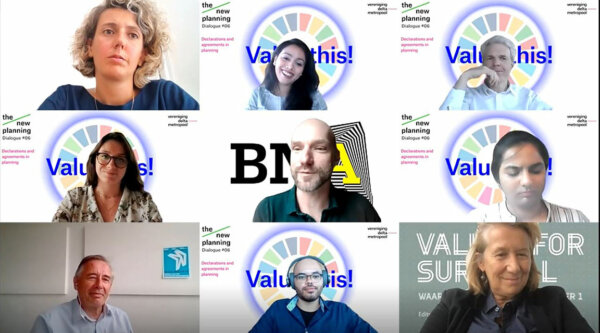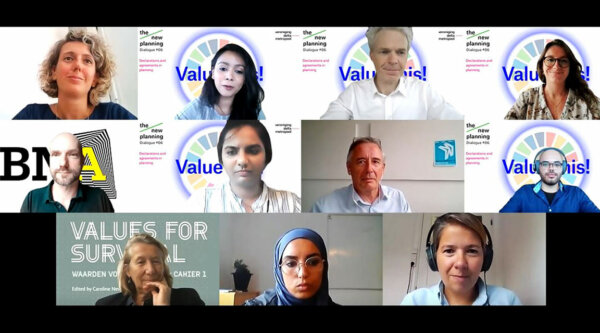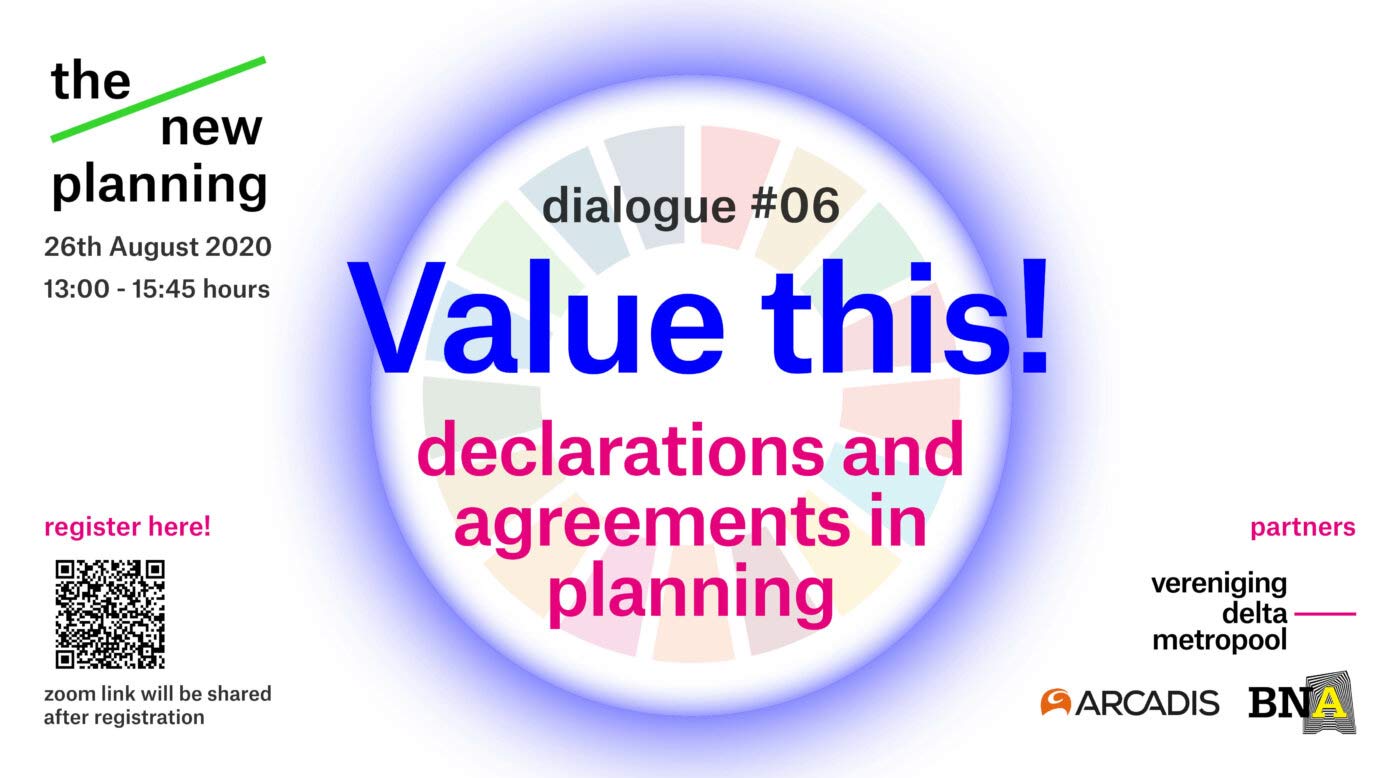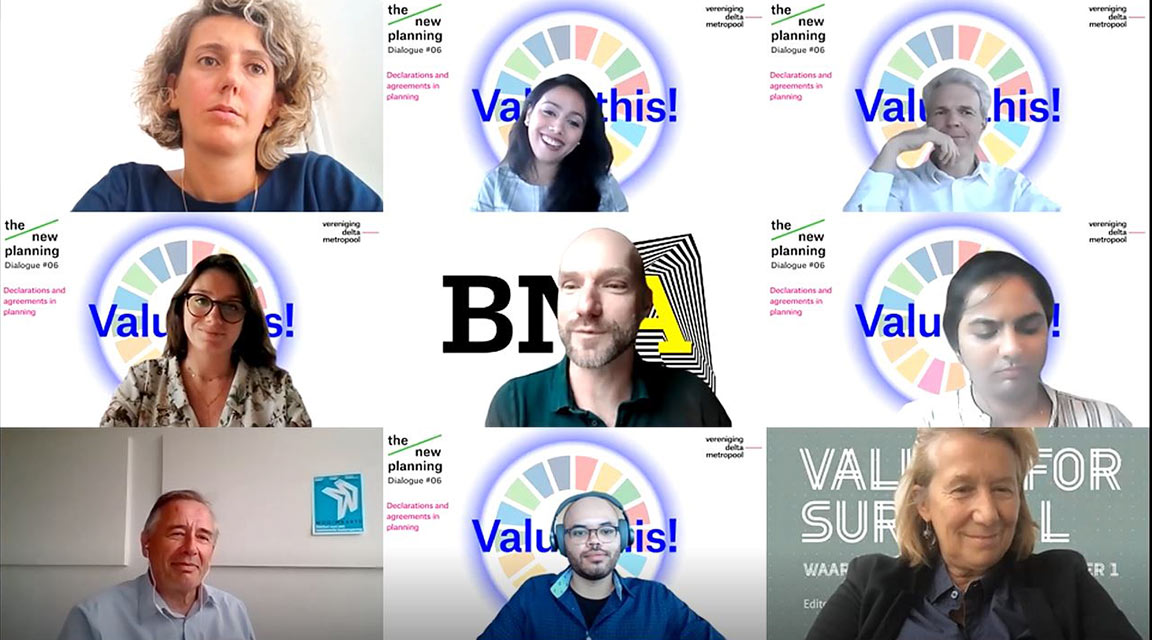Where is the Action Plan?
Reporting back - Value this!
08 september 2020
The New Planning Dialogue #06 "Value this! Declarations and Agreements in Planning" was organised as a masterclass session by Vereniging Deltametropool in collaboration with BNA International and Arcadis. This was second online session focused on some of the important global agendas and their definitive role in planning systems.
Watch full video of the event here
With various eminent speakers, the event focused on the relevance of global agreements such as ‘The 2030 Sustainable Development Goals’ (SDGs), The Paris Agreement 2018, Davos Declaration, European Green Deal etc, on addressing the urgencies of the Dutch spatial planning agenda. Through this session, we looked at how these agendas are perceived in decision making and how they can be translated from theory to practice.

We started with two panel discussions,focusing on the role of international agreements in planning and how they render into actions for policy makers and planners in the Netherlands. The panel discussions were followed by two presentations from Arcadis Netherlands and Be Sustainable Brussels which showcased examples from various projects involving sustainability as a guiding factor in the design process.
Introduction
Paul Gerretsen (Director, Deltametropolis Association) introduced the subject by highlighting the potential role that international deals must play to inform political planning in the Netherlands, which has lately been overlooked. He revealed the complex task ahead in reaching the goals set by these agendas such as the climate agreement of the Netherlands. By quoting the article by Naomi Klein for the New York Times, “Capitalism Killed Our Climate Momentum, Not “Human Nature” he emphasised the influence that capitalism, or rather neoliberalism has towards our inability to realise these targets effectively. Thus, the main question that we need to ask is how do we inform, change and make these agreements operational? How can we effectively inform such agendas?
Politically planning has been abandoned in the Netherlands, just at a moment where it is very much needed. Paul Gerretsen (Director, Deltametropolis Association)
Panel 1: Declarations and values in building culture in Netherlands
The first panel discussion in conversation with Flip ten Cate (Federation for Spatial Quality) and Caroline Nevejan (University of Amsterdam) and moderated by Paul Gerretsen (Deltametropolis Association), focussed on the extent and role that global agreements play in developmental policies and decision making. The discussion started with looking at the agreements and their link to newer developments and their influence on spatial quality. Flip pointed out that there is a need for balance between development and protecting quality. He brought to attention the lack of imagination and innovation in using the agreements to deal with the urgencies that the Netherlands face such as climate change, sea level rise and energy transition.
It is difficult to implement values into policy. Aesthetics are not measurable. Flip ten Cate (Federation for Spatial Quality)
However, Caroline Nevejan argued that the current language of the agreements like the Paris Agreement is often dedicated to and understood only by experts and not common people. However, the sustainable developmental goals or SGDs are more understandable by everyone, even though they play a smaller role in influencing decision making in the Netherlands. Thus, there is a gap in translating the agreements towards local initiatives that can create increased awareness amongst people. She strongly stated that design can act as a tool in bridging the gap and connecting science and policy.
International agreements mostly exclude us as only experts understand. Caroline Nevejan (University of Amsterdam)
Panel 2: Values in sustainable design and planning
The second panel in conversation with Martina Huijsmans (Wethouder, city of Delft) and Marcia van der Vlugt (Ministry of Interior and Kingdom Relations) and moderated by Paul Gerretsen (Deltametropolis Association), focused on the relation between international declarations and values in informing the reality of citizens on the ground. Martina talked about the main challenge that policy makers face which is related to the time dedicated for translating visions to concrete actions. She says while as engineers prefer more long-term solutions that can effectively address the challenges of the future, in politics the time frame is dictated by the elected term of the policy maker. She also adds that there is also a gap in translating regional goals to the local scale initiatives by municipalities and this proves to be a difficult task.
“Goals need to be accessible and everyone needs to understand them”. Martina Huijsmans (Wethouder, city of Delft)
Marcia agrees that this is mainly due to the complex task of translating the goals to transferable spatial measures at the local scale. She believes that the territory is just as important as the scale in addressing the regional and national goals, and only possible if there is effective communication between the different scales of government, to look at which actions can be implemented where.
“Translate territorial agreements to territorial agendas”. Marcia van der Vlugt (Ministry of Interior and Kingdom Relations).
Through the discussion, we realise the importance of integrating the scale sand looking for connections that can effectively translate national goals and agendas to transferable actions at a municipal level to be implementable in shorter time frames.
Approaches towards planning with agreements and declarations: Examples from practice
After a short coffee break, we moved onto the next part of the evening with approaches from examples in practice. The first presentation was on Sustainable approaches from public-private collaboration by Niels Driessen (Arcadis Nederland) which highlighted the ways to maintain the connections between the city and its inhabitants. Arcadis uses the approach of smart layers to connect the different levels in understanding the values that can guide the design process.
Niels showcased this through one of the projects by Arcadis on the neighbourhood of Crailo in NetherlandsEven though this current model has only been implemented at the neighbourhood scale, Arcadis believes that it is possible to scale up to larger scale such as the region. However, they acknowledge that the interest in value-based design is often dictated by the clients as well as funds available.
Sustainability is about making choices. And with that we need to translate ambitions into systems. Niels Driessen (Arcadis Nederland)
The second presentation of the evening was on Sustainable toolbox by Séverine Hermand (Be Sustainable Brussels). Séverine explained about the initiative Be Sustainable Brussels and the work that they undertake in line with the sustainable agendas. Be Sustainable platform is a network, tools, inspiration, knowledge and support to make your project an ambitious neighbourhood in terms of sustainability that is fully in line with the Regional Sustainable Development Plan (PRDD) of Brussels and in the United Nations Sustainable Development Goals. It is a programme of co-creation consisting of different institutions on a regional level that combines regulatory, strategic and operational tools. It is a platform for exchanging practices, with the idea of linking actors into one platform to act as a link between people, experts and administrators. They organise workshops and trainings, meetings and trips according to the needs and expertise of designers to bridge the gap between research and practice. You can read more about the approach and toolbox at https://besustainable.brussels/toolbox/.
Contextualization is very important. The idea is to link sustainability with transversality. Séverine Hermand (Be Sustainable Brussels)
Discussion

The two-presentations led to a very organic discussion on whether it is possible to measure values. The discussion led to interesting contradictions and opposing sides on whether monitoring is possible and if so, what is the proper way to do that? The discussion also led to several interesting points that it is not possible to measure all values but however monitoring of how they are used in an important step towards effective implementation. There is also an inherent bias dictated by companies as to what values or agreements to follow and it I important as designers and planners that we try to look beyond such aspects.
“Knowing does not lead to acting, design does”. Terry van Dijk (Rijksuniversitiet Groningen)
We will be taking up all these points in detail in our upcoming publication “The New Planning Cookbook”
Conclusion
Mathias Lehner (BNA international) summarised the key points from the evening by providing insights into the discussion that it is possible to plan upon these global agreements, however there is still a long way for us to go. He pointed out that it is important to look at the process and understand the important roles that stakeholders can play especially by architects and designers, and it is only possible through involvement of image and imaginationHe also addresses that monitoring is essential to evaluate the progress. In conclusion, there is optimism in the future as we realise that design can form a successful part in bridging research and policy. And finally, Mathias concluded the session by quoting one of our participants, Terry van Dijk, “Knowing does not lead to acting, design does”.
It is possible to plan upon these global agreements. It is already happening even though there is still a way to go. Mathias Lehrer (BNA international)
You can read more about the comments from Mathias Lehner, in an article written by him, through this link.
Next steps?
We are working on reports and papers on each subject that can be combined together in a publication format at the end of The New Planning Dialogue. The publication “The New Planning Cookbook” will showcase the results and process of the dialogue. The expected outcome will provide a new model, a co-created framework for city planning. This will act as a support to put research into practice, with the creation of an efficient working method with the involved practitioners. We are in discussion with ISOCARP, Eurocities and Metrex to find the appropriate ways to disseminate the results in broader networks in Europe. Please feel free to get in touch with us to contribute to our publication, ‘Cookbook’. If you are interested in contributing to it, fill in this google form to get in touch with us.
Make sure to register for our upcoming event, ‘Planning for all’ on 2nd October.
Thank you to all the participants for joining us online and a special thank you to the collaborators that made the online session possible, our speakers as well as from team Deltametropool, Paul Gerretsen, Lea Soret, Thomas Dillon, Malavika Krishnan and Alankrita Sarkar.
Join the dialogue to opinionate, influence and revolutionize the planning model and support the project by your eminent participation.
Follow the link to know more about the project and connect to us .

